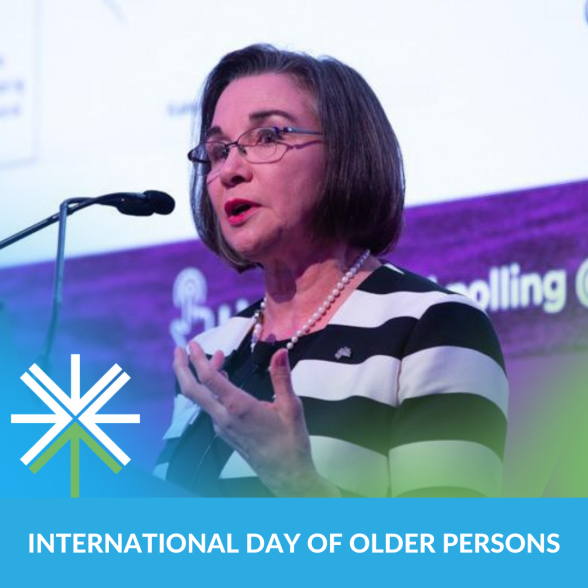By Kate Swaffer © 17 September 2024
October 1, 2024, is the International Day of Older People (IDOP), a day of observance which commenced on December 14, 1990. The United Nations General Assembly voted to establish it on October 1, and it was recorded in Resolution 45/106. Many individuals and organisations representing older people ‘celebrate’ it annually to recognize the contributions of older persons and to examine issues that affect their lives, or the lives of older people they represent.
Whilst dementia is not a normal part of ageing, we know ageing is a risk factor for dementia. Despite this, the International Day of Older People is not something many of our members want to ‘celebrate’.
This is because too many of our rights are still being denied, and the negative experiences most of us face, including ageism, ableism, discrimination, stigma, therapeutic nihilism, othering, benevolent othering, and a lack of access to post diagnostic support that includes disability assessment and support beyond ‘Activities of Daily Living’ (ADL’s). We are not even equitably included in issues and campaigns that are meant to impact us, such as the dementia-friendly initiatives.
This year, the 34th commemoration of the United Nations International Day of Older Persons will focus on the theme of “The part we play,” which aims to celebrate the integral role of older people in our communities.
If you are not actively involved, it is difficult to create the change you might want. In the part I played leading up to IDOP, I was interviewed recently about living with dementia, and noted that dementia continues to be the only disease I know of where those diagnosed are not supported to fight for their lives. Whilst this may seem hard to believe, it is our reality, and it is not acceptable.
Even the dementia villages are being embraced as the way of the future for people with dementia who require assisted living. They have been established by people without dementia, and worse, have been developed and promoted with zero consideration to the reality that these villages are just the latest form of segregation. We don't have villages for people with cancer or schizophrenia, or any other health condition that segregates and ‘others’ those groups of people.
Prior to discussing the rights of people diagnosed with dementia and older people, it is important to be reminded that the Universal Declaration of Human Rights (UDHR) is a milestone to document in the history of human rights. Drafted by representatives with different legal and cultural backgrounds from all regions of the world, the Declaration was proclaimed by the United Nations General Assembly in Paris on 10 December 1948 (General Assembly resolution 217 A) as a common standard of achievements for all peoples and all nations. It sets out, for the first time, the fundamental human rights to be universally protected and it has been translated into over 500 languages. The UDHR is widely recognized as having inspired, and paved the way for, the adoption of more than seventy human rights treaties, applied today on a permanent basis at global and regional levels (all containing references to it in their preambles).
The Universal Declaration of Human Rights is in its 76th year. Whilst it is still the first document articulating the fundamental human rights that are meant to be universally protected, people with dementia and older people are still being denied many of their universal rights. We look to a future that delivers on the promise to ensure that all persons, including all older persons – and people with dementia, have equal access to their human rights and fundamental freedoms.
Sadly, the reality is that older people and people with dementia are more often denied access to these rights. This Universal Declaration of Human Rights may be inspiring, but it has made little difference to our lives...
People with dementia continue to experience high levels of ageism, ableism, and a denial of their most basic human rights. Dementia is perceived as an ‘old person's disease’, and as such, even if someone is diagnosed with dementia at the age of 35, they start to experience the ‘pitfalls’ of being an older person. It adds significantly to the stigma and discrimination they still experience after their diagnosis.
This is also partly why the Global Alliance for the Rights of Older People (GAROP) is campaigning for an Older Persons Convention. It was established in 2011, three years before DAI was established, and like DAI, was born out of the need to strengthen the rights and voice of older people globally. DAI is one of more than 400 members of this alliance and continues to collaborate with them for the rights of all older people, to ensure people with dementia are not left behind.
Why do we need a convention for older people?
Age discrimination and ageism are tolerated across the world, and older people experience discrimination and the violation of their rights at family, community and institutional levels. At the same time, unprecedented demographic ageing means that the number of people who are likely to experience age discrimination and violation of their rights in old age will increase. Despite the fact that international human rights laws apply to people of all ages, specific reference to older people is rare. As a result, older people’s rights are not being protected sufficiently by human rights monitoring mechanisms, governments, the human rights community and civil society.
So while DAI observes the International Day of Older People, and indeed, any other relevant UN Observance days, it is difficult for some of us to believe they have or will make a difference to our experiences of being older, or of a diagnosis of dementia.
The GAROP table below highlights many of the international human rights Articles that are meant to apply to all people, including older people and people with dementia. Society continues to fail us, as so many of these basic human rights are not enacted.

